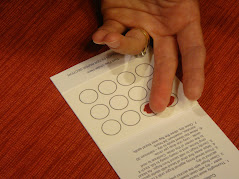CardioChek home cholesterol device
Say you want to monitor your own cholesterol values. Say, for instance, you make a specific change in diet or lifestyle and would like to know if it has exerted any effect on cholesterol values like HDL, LDL, or triglycerides. Can you assess the effect without involving your doctor?
It has become increasingly easy with home cholesterol testing. The only hand-held at-home device that I'm aware of is the CardioChek.

The CardioChek is a hand-held device that measures total cholesterol, HDL cholesterol, and triglycerides that you can purchase for home use. It requires a finger prick to obtain a drop of blood for testing.
This is a really neat concept: a device that can be used by just about anybody that yields immediate results. Nothing needs to be mailed to a laboratory, no wait for results. It also yields more than just a total cholesterol. All other home test kits I could find tested only total cholesterol and the sample had to be mailed to the laboratory.
However, having used the device several times, some comments:
1) The company is not very good about telling you that each test--total cholesterol, HDL, and triglycerides--require a separate fingerstick and a separate test strip. It means that, for every panel of total cholesterol, HDL, and triglycerides, 3 fingersticks have to be performed and 3 test strips used.
2) The first couple of tests will be cumbersome. Even my nurses had a bit of difficulty following the instructions, though they were quite clear and concise. (They do provide a helpful online video.)
3) LDL will need to be calculated, just as your laboratory does. (LDL = total cholesterol - HDL - triglycerides/5).
How about costs? The device can be obtained for as little as $79 at Walmart and Amazon.com. The tests strips come in separate boxes, purchased separately. A set of 3 total cholesterol test strips costs between $12 and $15; similar prices for HDL and triglycerides. Thus, each run of total cholesterol, HDL, and triglycerides will cost you about $12-15 (3 test strips), provided there are no fumbles (which are somewhat common, particularly at first.)
Availability is a bit of a difficulty. The CardioChek website lists CVS, Walgreen's, and Walmart as retailers, along with several online distributors that I've never heard of. I bought a device at CVS for $99, test strips for $14.95 each for HDL and total cholesterol. However, after stopping at 5 different CVS locations, 3 Walgreen's, and one Walmart, none carried triglyceride test strips, which therefore have to be purchased online. Also, none of the Walgreen's or Walmart even carried the device itself, despite the website's claims.
Despite the hurdles, the CardioChek device is a useful and practical tool if you are interested in monitoring your own cholesterol values. With a bit of practice, you can get quite facile at performing this on your own with an accuracy close to that of your doctor's office or laboratory.
It has become increasingly easy with home cholesterol testing. The only hand-held at-home device that I'm aware of is the CardioChek.

The CardioChek is a hand-held device that measures total cholesterol, HDL cholesterol, and triglycerides that you can purchase for home use. It requires a finger prick to obtain a drop of blood for testing.
This is a really neat concept: a device that can be used by just about anybody that yields immediate results. Nothing needs to be mailed to a laboratory, no wait for results. It also yields more than just a total cholesterol. All other home test kits I could find tested only total cholesterol and the sample had to be mailed to the laboratory.
However, having used the device several times, some comments:
1) The company is not very good about telling you that each test--total cholesterol, HDL, and triglycerides--require a separate fingerstick and a separate test strip. It means that, for every panel of total cholesterol, HDL, and triglycerides, 3 fingersticks have to be performed and 3 test strips used.
2) The first couple of tests will be cumbersome. Even my nurses had a bit of difficulty following the instructions, though they were quite clear and concise. (They do provide a helpful online video.)
3) LDL will need to be calculated, just as your laboratory does. (LDL = total cholesterol - HDL - triglycerides/5).
How about costs? The device can be obtained for as little as $79 at Walmart and Amazon.com. The tests strips come in separate boxes, purchased separately. A set of 3 total cholesterol test strips costs between $12 and $15; similar prices for HDL and triglycerides. Thus, each run of total cholesterol, HDL, and triglycerides will cost you about $12-15 (3 test strips), provided there are no fumbles (which are somewhat common, particularly at first.)
Availability is a bit of a difficulty. The CardioChek website lists CVS, Walgreen's, and Walmart as retailers, along with several online distributors that I've never heard of. I bought a device at CVS for $99, test strips for $14.95 each for HDL and total cholesterol. However, after stopping at 5 different CVS locations, 3 Walgreen's, and one Walmart, none carried triglyceride test strips, which therefore have to be purchased online. Also, none of the Walgreen's or Walmart even carried the device itself, despite the website's claims.
Despite the hurdles, the CardioChek device is a useful and practical tool if you are interested in monitoring your own cholesterol values. With a bit of practice, you can get quite facile at performing this on your own with an accuracy close to that of your doctor's office or laboratory.




0 comments:
Post a Comment